PREVIOUS
LGBTQ+ Rights in India – Part 3
November 22 , 2023
825 days
2236
0
(இதன் தமிழ் வடிவத்திற்கு இங்கே சொடுக்கவும்)
Written arguments of Petitioners
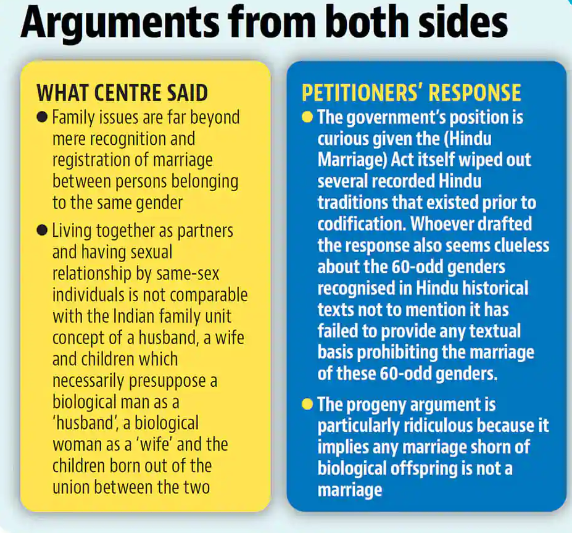
Employment
- Couples from sexual and gender minority communities in government service cannot request same-city postings.
- A sexual and gender minority partner cannot receive the healthcare coverage provided to the spouse of government employees.
- Couples from sexual and gender minority communities are not eligible for compassionate appointments or family pensions.
- Under the Indian Acts, sexual and gender minority employee cannot nominate their legally unrecognised family for benefits and entitlements as long as their biological or adoptive family members are alive.
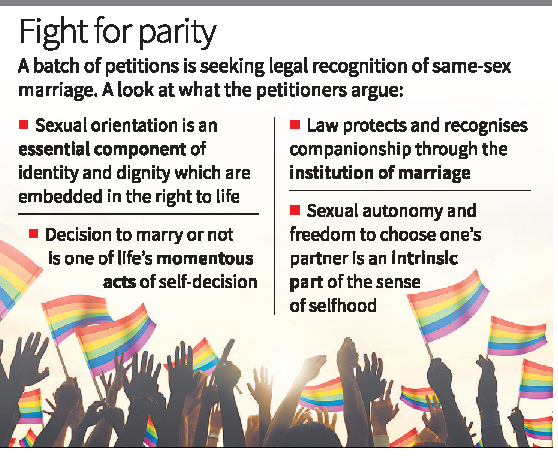
Some of the Acts highlighted by the petitioners are
- Employee's Compensation Act of 1923,
- Employees' Provident Funds Act of 1952,
- Payment of Gratuity Act of 1972,
- Payment of Wages Act, 1936 and
- Unorganized Workers' Social Security Act of 2008.
- Since private entitlements, such as healthcare and other spousal benefits extended in private employment, exclude sexual and gender minority family members, sexual and gender minority individuals face more barriers and higher scrutiny in acquiring spousal benefits.
Housing
- Couples from sexual and gender minority communities do not have the right to reside in a shared household.
- Hence, sexual and gender minority individuals cannot rely on their partner's rented or owned home to prove residence for official purposes.
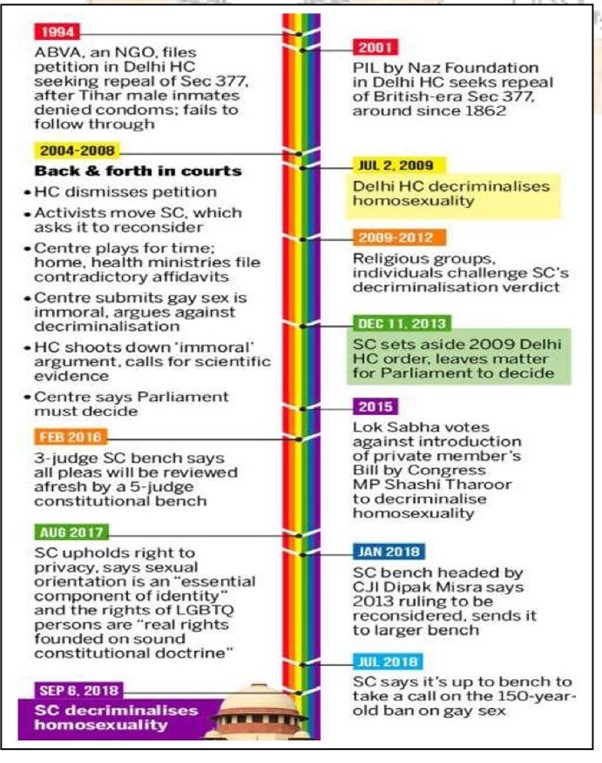
Parenthood
- Without recognition of the right to marry, couples from sexual and gender minority communities cannot have children through adoption, surrogacy, or assisted reproductive technologies.
- The Juvenile Justice Act of 2015, along with relevant rules, does not allow unmarried couples and couples in a live-in relationship to adopt children as a couple.
- The Adoption Regulations of 2022 state that a child cannot be given in adoption to a couple unless they have at least two years of a stable marital relationship.
- In line with the Adoption Regulations, the Central Adoption Resource Authority has decided that single prospective adoptive parents, who are in a live-in relationship with a partner, will not be considered eligible to adopt a child.
- The Surrogacy (Regulation) Act of 2021 allows only married couples to have children through surrogacy.
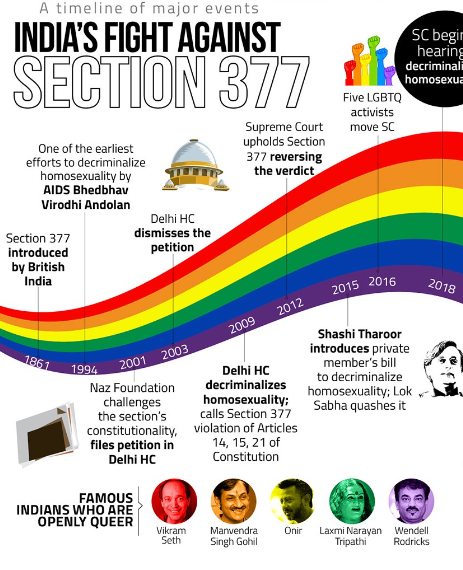
Issues with such marriages
Morality
- This has brought with it a change in social attitudes so that the stigma attached to homosexuality has to a greater extent disappeared.
Rising activism
- Campaigns for lesbian and gay rights have taken on an increasingly radical character, arguing for an end to all forms of discrimination against homosexuality.
Procreation
- Some argue that the primary purpose of marriage is procreation, and same-sex couples cannot have biological children.
Against Nature
- Same-sex marriage is considered to go against the natural order of things
Legal Issues
- Contentious issues from such a marriage are such as inheritance, tax, and property rights
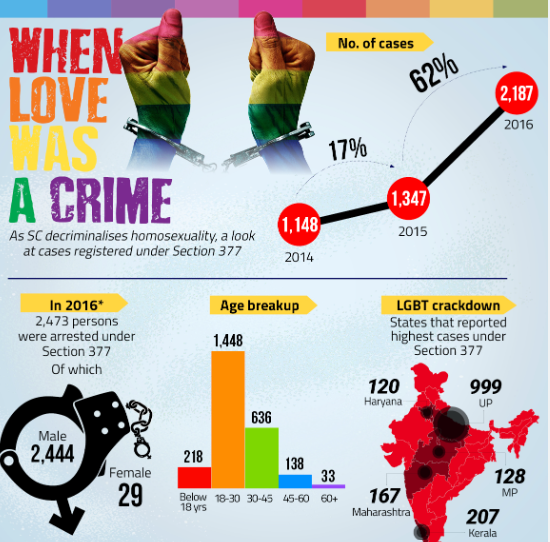
Adoption
- Adoption by queer couples can lead to societal stigma, and discrimination.
- Thus, it is negatively impacting a child’s psychological well-being (esp. in conservative societies).
Religious sanctions
- Same-sex acts are punishable by death in Arab countries.
- No religion in the World openly embraces same-sex marriage.
- More or less, they are considered unnatural everywhere.
Social stigma
- Apart from the harsh legal scenario, homosexuals face social stigma as well.
- Same-sex marriages are still unimaginable as any instance of sexual relations between a couple of the same sex draws hatred and disgust.
Patriarchy
- It must not be forgotten that Indian society is patriarchal in nature and the fact that certain women and men have different choices.
- It is not sanctioned by the ‘order’, frightens them in a way.
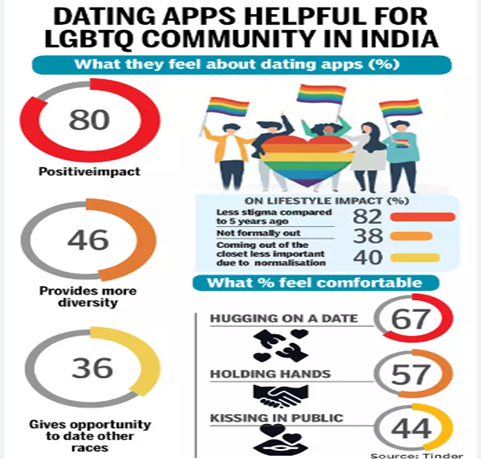
Burden of collectivity
- Our society is very community oriented and individualism is not encouraged in the least.
- Any expression of homosexuality is seen as an attempt to renounce tradition and promote individualism.
Arguments in favor of such marriages
Pursuit of happiness
- Homosexuality is not an offense, it is just a way of the pursuit of happiness, a way to achieve sexual happiness or desire.
Right to privacy
- The fundamental right to liberty (under Article-21) prohibits the state from interfering with the private personal activities of the individual.
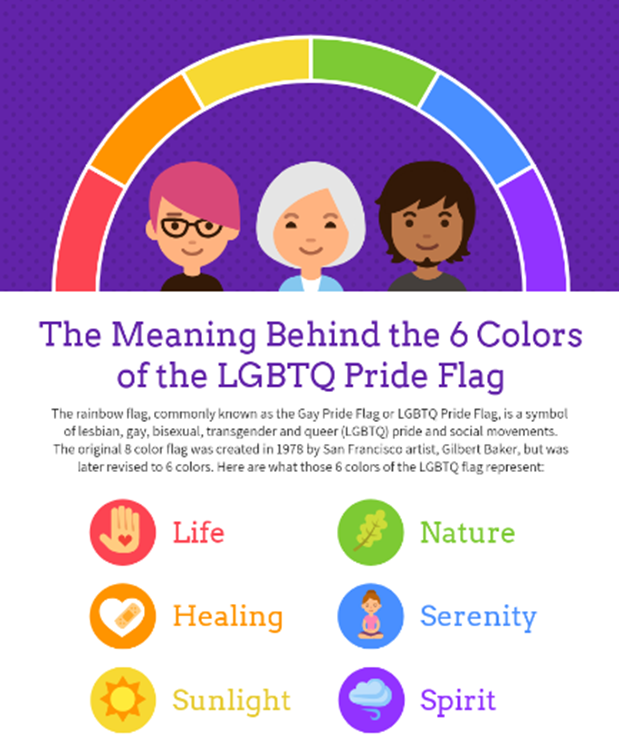
Arbitrariness
- Infringement of the right to equal protection before the law requires the determination of whether there is a rational and objective basis to the classification introduced.
Issues with the definition
- Section-377 of IPC assumes that a natural sexual act is that which is performed for procreation.
- Hence, it thereby labels all forms of the non-procreative sexual act as unnatural.
Discrimination
- Section-377 discriminates based on sexual orientation which is forbidden under Article-15 of the Constitution.
- Article-15 prohibits discrimination on several grounds, which includes Sex.
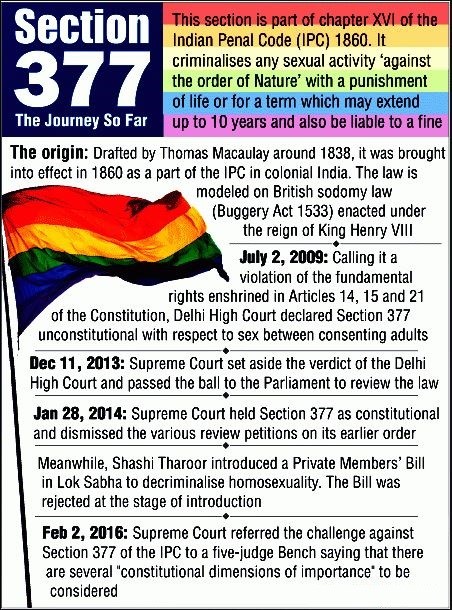
Human rights
- The universal law of Human Rights states that social norms, tradition, custom or culture cannot be used to curb a person from asserting his fundamental and constitutional rights.
What the court said on privacy
- Privacy includes at its core the preservation of personal intimacies, the sanctity of family life, marriage, procreation, the home and sexual orientation.
- The state currently denies this right.
- The right to privacy entails the right of the citizens to make decisions about their family life and marriage.
- The state currently denies same-sex couples this right.
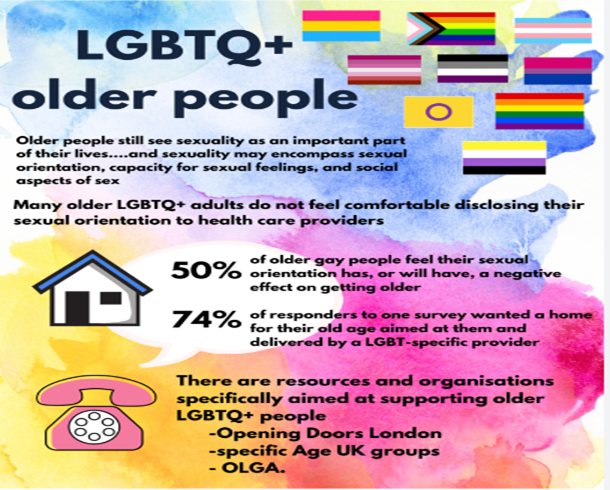
The Special Marriage Act
- The Special Marriage Act of 1954 is a secular law that works alongside religious personal laws.
- Same-sex marriages can be recognized under the Special Marriage Act.
- The Act already speaks of marriages between any two persons which are solemnized under it.
- The Special Marriage Act is a law in India that allows individuals of different religions or nationalities to marry each other.
- It was enacted in 1954 and came into effect in 1955.
- The Special Marriage Act allows for inter-caste and inter-religious marriages, and couples who register under this act are not required to change their religion or follow any religious rites or rituals.
- However, the act does not recognize same-sex marriages.
- The act also provides for divorce on certain grounds and maintenance to the spouse and children.
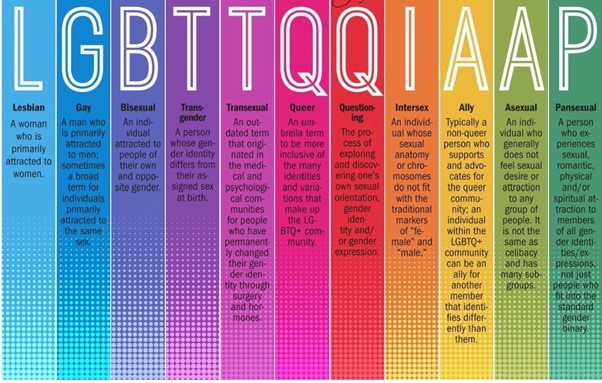
The Judicial basis for same-sex marriage
- Decriminalization of IPC section 377 was done in the Navtej Singh Johar & Ors. V. Union of India (2018).
- In this landmark verdict, the Supreme Court scrapped the controversial Section 377– a 158-year-old colonial law on consensual gay sex.
- Section 377, which is part of an IPC 1860, banned “carnal intercourse against the order of nature with any man, woman or animal”.
- It was interpreted to refer to homosexual sex.
- The Supreme Court reversed its earlier own decision and said Section 377 is irrational and arbitrary.
- The judgment was delivered by a Bench of Chief Justice of India Dipak Misra and Justices Rohinton Nariman, AM Khanwilkar, DY Chandrachud and Indu Malhotra.
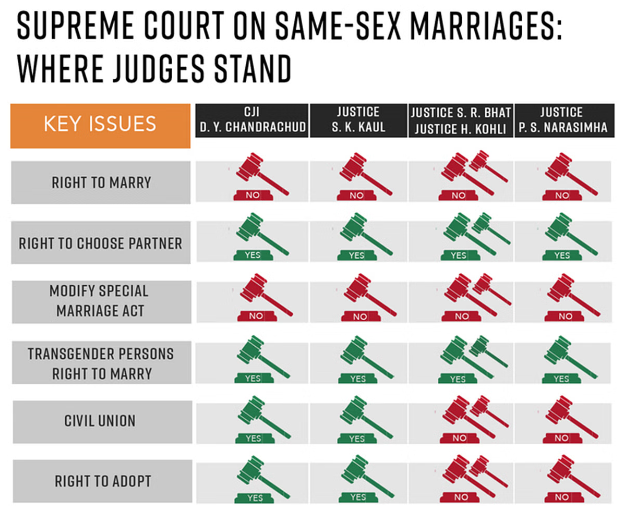
The Government affidavit
- The main points of the Government affidavit are following
- Heterosexual marriage has been the norm throughout history.
- It is “foundational to both the existence and continuance of the state.”
- Marriage in India is regarded as a “holy union,” a “sacrament,” and a “Sanskar”.
- It is dependent on customs, rituals, practices, cultural ethos, and societal values.
- Any “deviation” from the “statutorily, religiously and socially” accepted norm in “human relationships” can only happen through the legislature and not the Supreme Court.
- In its affidavit to the Supreme Court, the government argued that the traditional concept of marriage, consisting of a biological man, woman and child, cannot be disrupted.
- It claimed that recognizing same-sex marriages could cause havoc in the system of personal laws.
- As different from many liberal democracies, in India, aspects of marriage, succession and adoption are governed by religious personal laws.
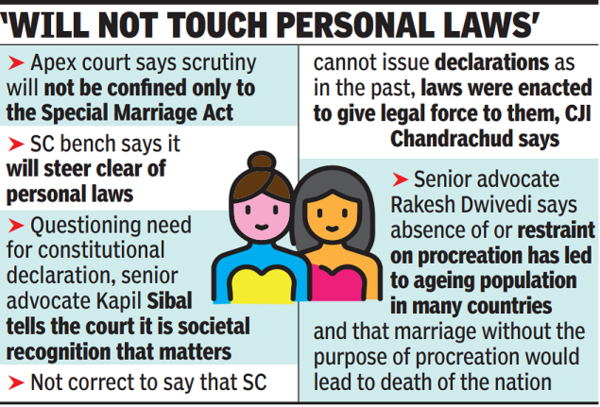
Other observations
- The court can neither strike down nor read words into the Special Marriage Act (SMA) 1954 to include same-sex members within the ambit of the SMA 1954, only the legislature can do that.
- The relationship of marriage is not a static one.
- Queer persons have an equal right and freedom to enter into a “union”.
- However, there is no fundamental right to marry under the Constitution.
- The court favored the government’s proposal of a committee headed by Cabinet Secretary to look into entitlements for same-sex couples.
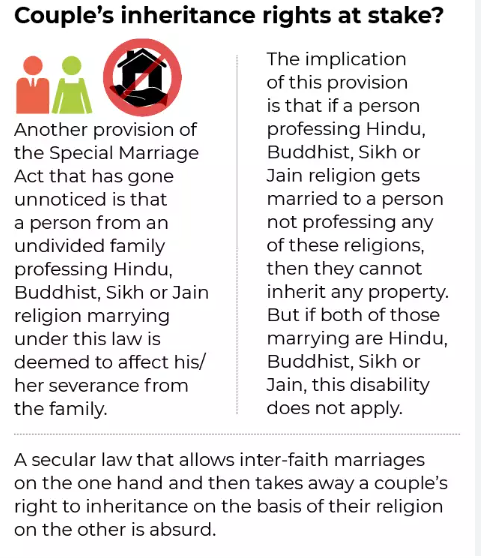
Leave a Reply
Your Comment is awaiting moderation.


